Today's Hours:09:00-18:00
>>
Research Guides
Exploration of Research Topics
Researchers often need literature to support the background of their main research. You can make use of the various functions in the database to explore and think of research topics and examine the development trends of a research domain, allowing you to avoid wasting time on repeating research.
You can also use the population-intervention-comparison-outcome (PICO) model for general or EBM questions: Formulate a question by cross-searching for known concepts in the research question with "AND" (e.g., diabetes AND cardiovascular), click on Refine Results (post-classification) to show a list of keywords, focus your results to relevant topics such as specific interventions or risk factors, and assess the published articles to identify areas that are more popular or relatively lacking (number of articles).
Databases with "Refine Results" function include Ovid Medline, Embase, EBSCOhost (MEDLINE, CINAHL, and databases for various disciplines) etc., and Web of Science, Scopus, etc. Taking Scopus as an example:
Step 1. Search for articles in the database

Step 2. Click on "View all" below a list of Keyword (or Subject depending on the database used) under Refine Results on the left of the search result
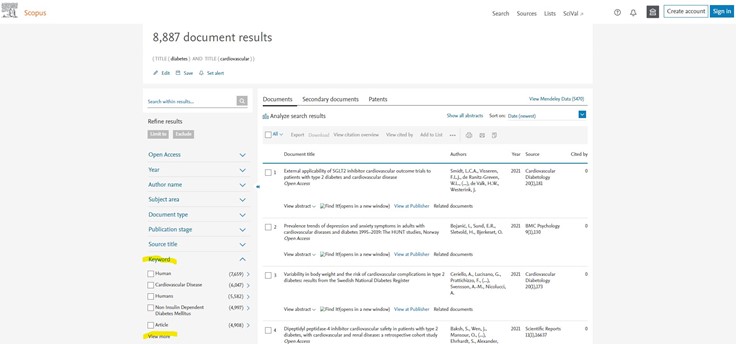
Step 3. Examine the list of keywords and number of results according to your background knowledge and needs and explore the direction on which to focus your research, such as different types of intervention (yellow-highlighted words: exercise, diets, lifestyle, medications) or risk factors (green-highlighted words: metabolic syndrome X, biological marker).
Scopus_3_RefineKW_English.jpg
Scopus and Web of Science can analyze search results and produce graphs. Taking Web of Science as example:
Step 1. Search for articles in the database
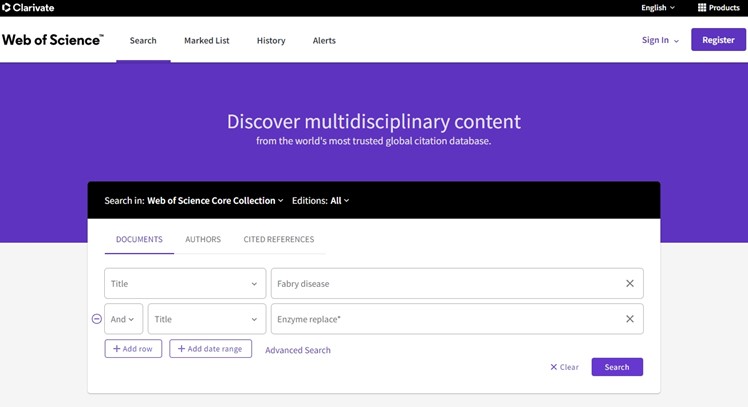
Step 2. Click on "Analyze Results"
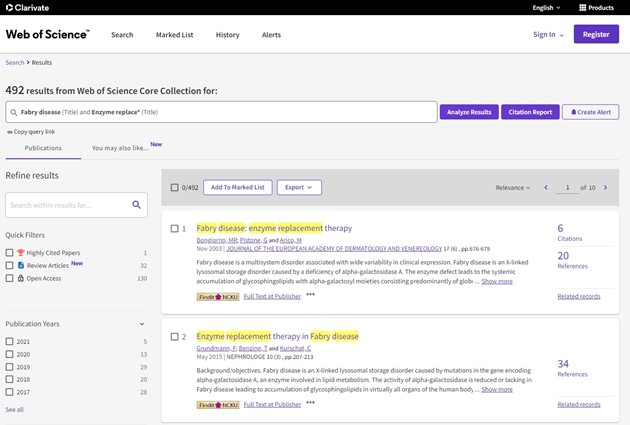
Step 3. Click on "Publication Years", choose "Bar Graph" from the drop-down menu of Visualization, and select Number of Result: 25. Bar graph)
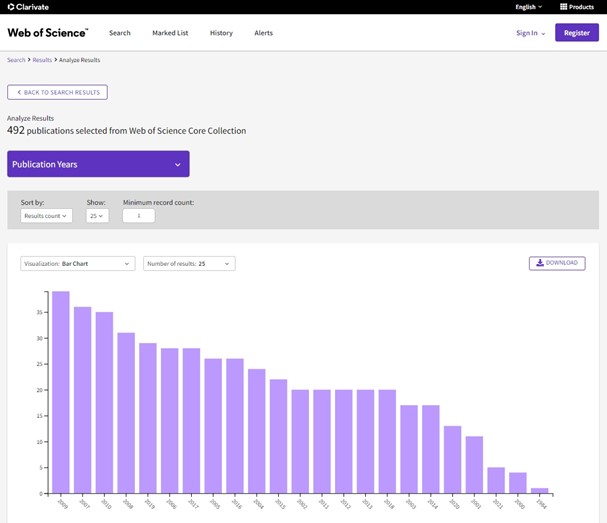
Systematic Review
Systematic reviews are studies designed for the highest level of evidence in evidence-based medicine. They focus on specific healthcare problems and follow rigorous, systematic, and reproducible methods to reduce the possibility of research bias. Systematic reviews are a type of research method that attempts to formulate problems, search, filter, and evaluate single studies and also integrates the presentation of research evidence and provides clinical recommendations. Meta-analysis (MA) uses statistical methods to synthesize and summarize different research data and provide quantitative evidence.
The medical library designs course materials by following the Cochrane Handbook, PRISMA (Preferred Reporting Items for Systematic Reviews and Meta-Analyses), and other research guides to efficiently and comprehensively search for and manage literature papers, and promote the publication of high-quality studies. Courses are offered on a monthly basis. Course content covers two topics and four units. A certificate of completion is awarded upon completion of the designated course. You can visit SR website for more information.
Course material:
Medical Search methods course slides | Documentation Form
Non-medical Search method course slides | Documentation Form
Database syntax comparison table
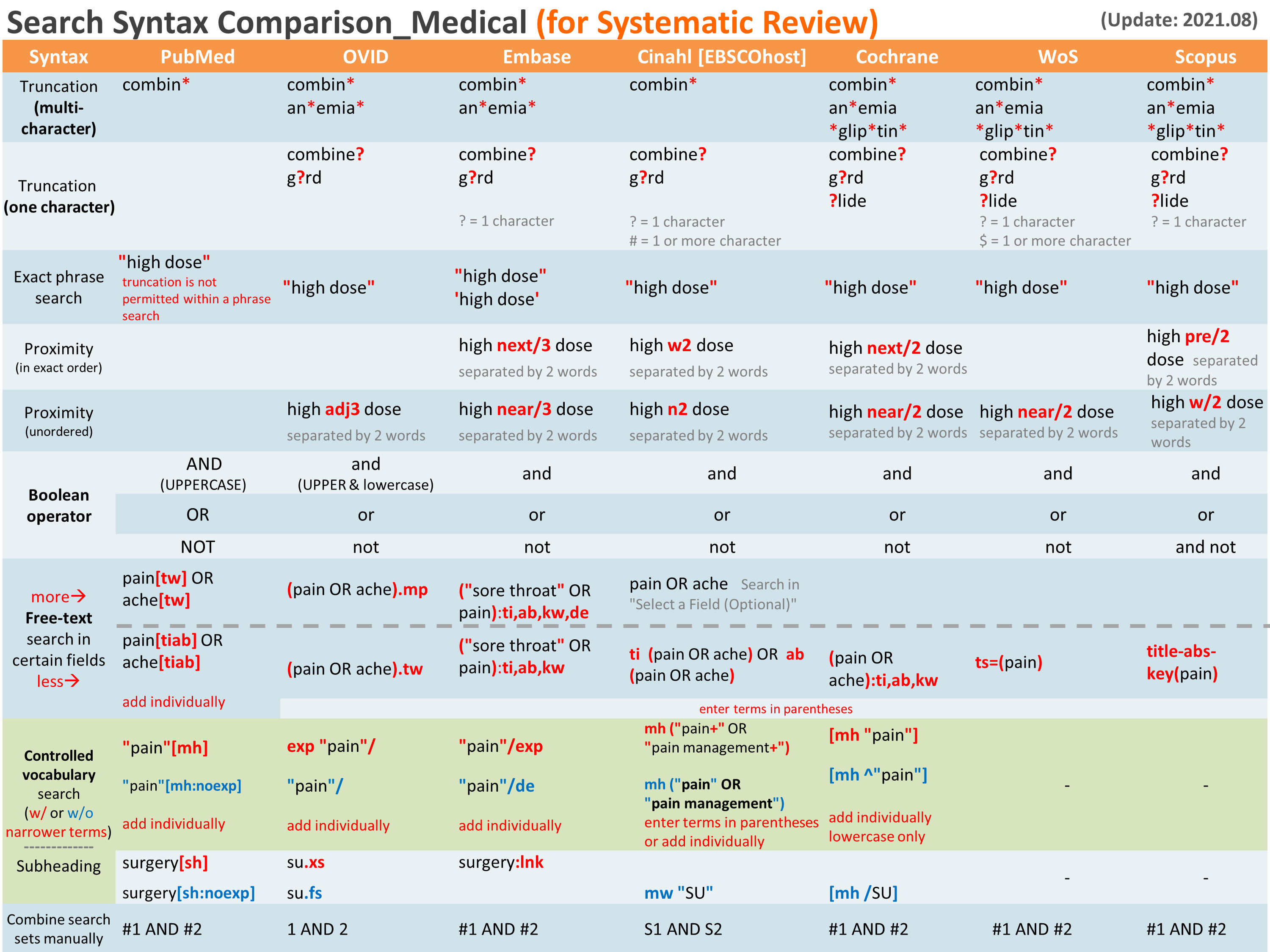
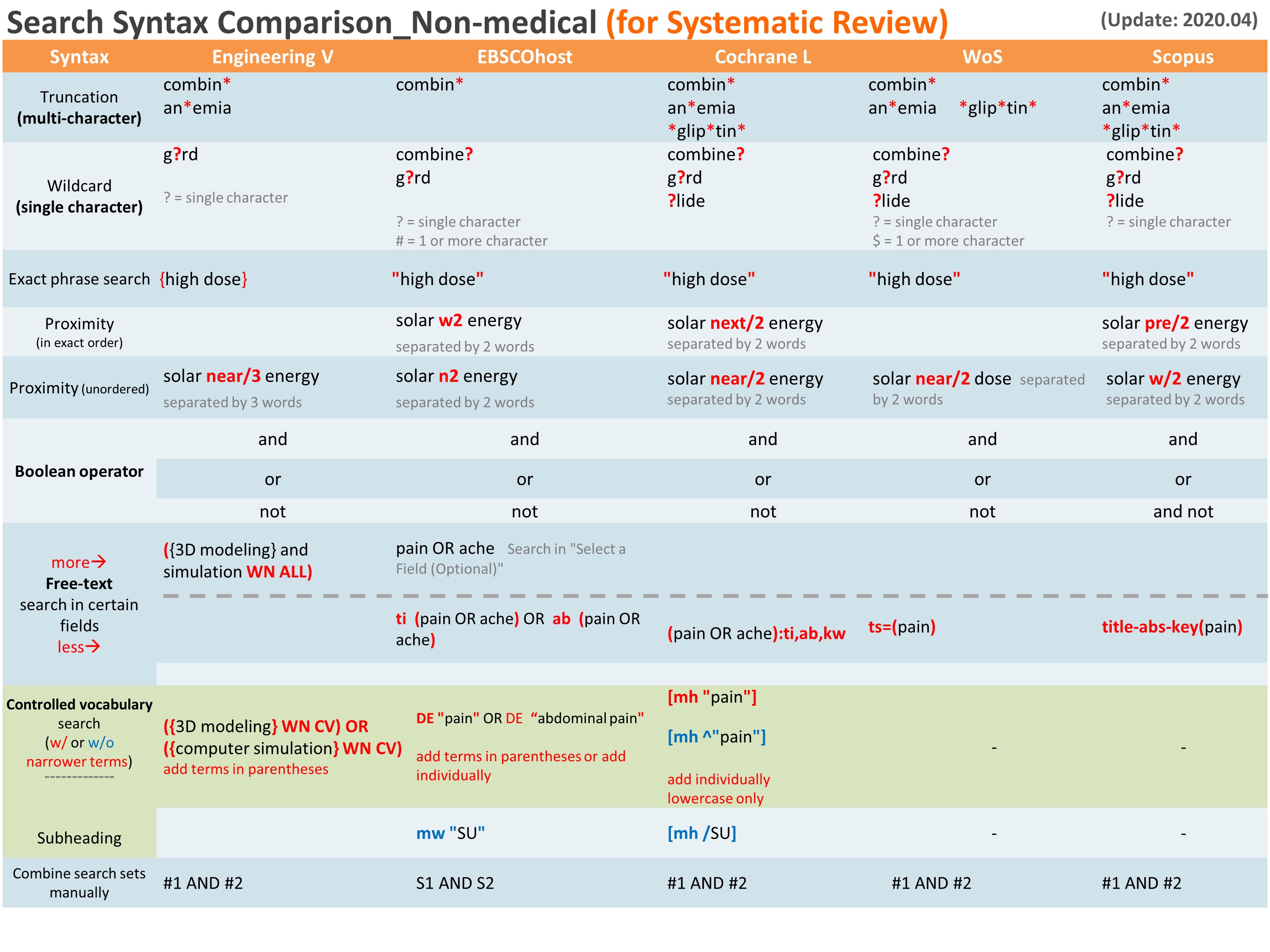
Filters for various study designs
After a combined search of the search terms is completed and the number of results is obtained, the appropriate method of screening syntax is adopted according to the research design to be analyzed. For medical disciplines please see Appendices 2-1~2-3 (p.5~p.7) of Documentation Form for the filters used in each database/platform corresponding to the different types of research designs: RCT, Cohort Study, Case-control, observational study, and qualitative study, respectively. Note that the appropriate filters or hand-searching method should be used for different types of research questions (Therapy, Diagnosis, Etiology…), designs, databases (MEDLINE, Embase, CINAHL, Web of Science, Scopus), and platforms (Ovid, EBSCOhost). (Database built-in research design filter functions have greater accuracy; filters required for systematic reviews can achieve higher sensitivity through research-verified search syntax to reduce the possibility of excluding relevant articles.)
This course shows ways to use Endnote, Rayyan, Abstractkr, etc. in systematic reviews by following the PRISMA flowchart to manage literature screening process, including editing preferences, excluding duplicates, sorting article correlation and merging the EndNote Libraries of at least two Review Authors for abstract and full-text screening.
EndNote: In the processes of systematic review, how to managing result screening process with Endnote-assisted PRISMA clearly to manage literature screening process, including editing preferences to excluding duplicates and merging the EndNote Libraries of two Review Authors for abstract and full-text screening to reach consensus in both steps.
Rayyan: An online collaboration website for SR result screening process
Abstractkr: An online collaboration website for SR result screening process
Findit@NCKU
What you need the most after finding the desired article is access to the full text! This section shows you how to use relevant functions in various databases and EndNote to obtain full-text articles quickly and legally, without blindly searching for full-text articles on library websites or online search engines and excluding various full-text sources provided by libraries.

Findit@NCKU (SFX) is a full-text path service that can be embedded in various databases, Google Scholar, and EndNote. It displays on a screen all possible paths for obtaining full-text electronic articles, paper collections, interlibrary photocopying, etc., and provides information on whether a journal is included in the JCR (Impact Factor).
Go to PubMed (web link exclusive to NCKU) and you can see the Findit@NCKU icon next to each article. (Settings not required in other databases)
Go to Google Scholar, at the top left corner of the page click on Setting > Library links, and select Findit@NCKU.
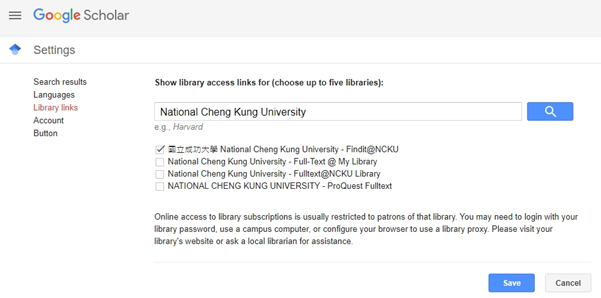
Step 1. In EndNote, go to Edit > Preferences > Find Full Text > OpenURL Path http://sfx.lib.ncku.edu.tw:3410/sfxlcl41
EN_FindFT_1_English.jpg
Step 2. Select one or more full-text articles that you want to download, and use the Find Full Text function by right-click to automatically download full-text articles.
Step 3. If some articles cannot be downloaded automatically, select the articles one by one and right click on the mouse, and then click on URL > OpenURL Link to access the full-text path of Findit@NCKU
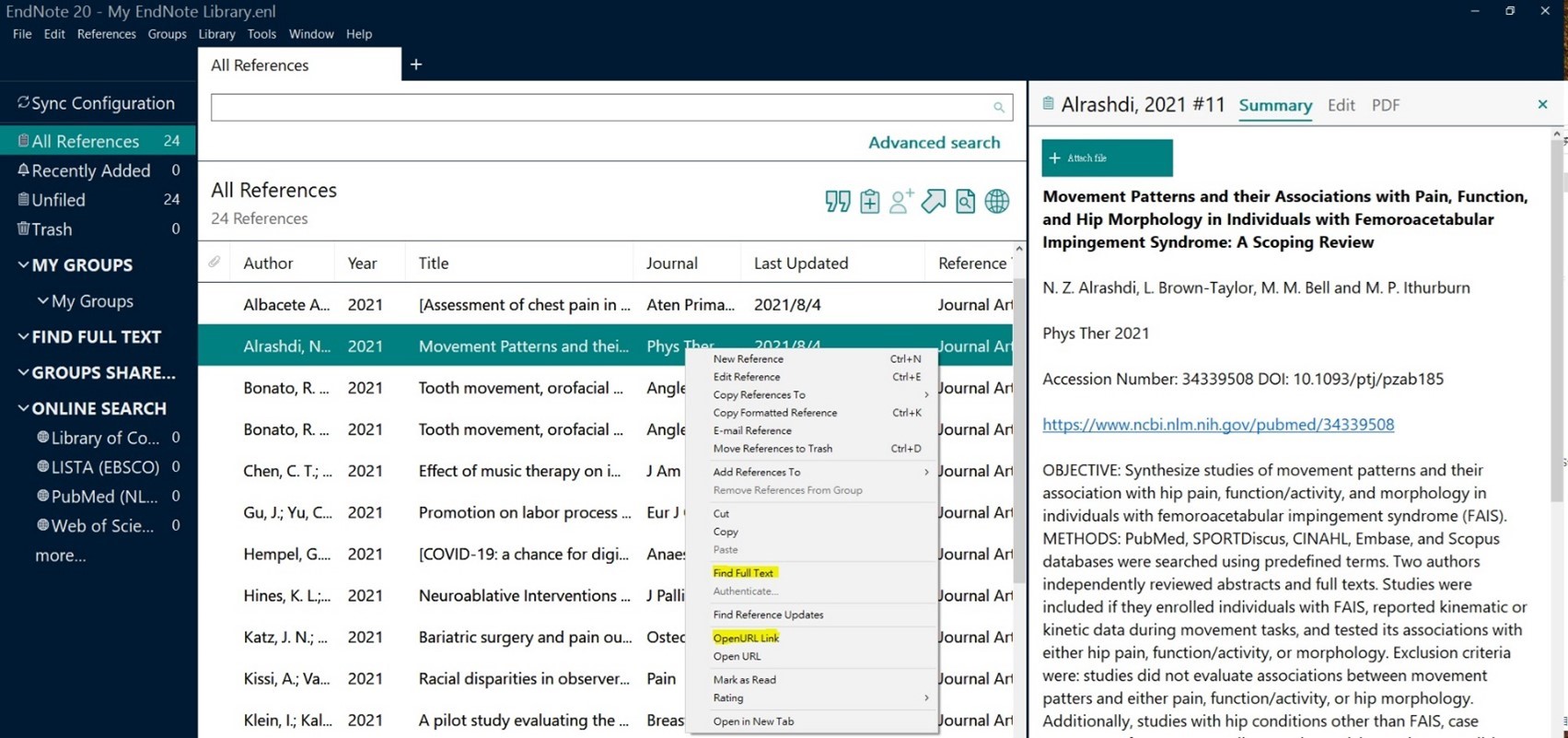
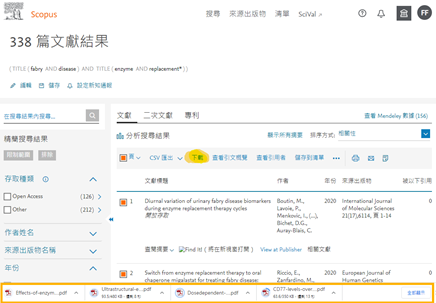
Clarivate's free browser plugin (formerly known as Kopernio) is particularly suitable for new EndNote users. It helps them to access full-text research papers in PubMed, Web of Science, and Google in one click and includes library subscriptions and open access.
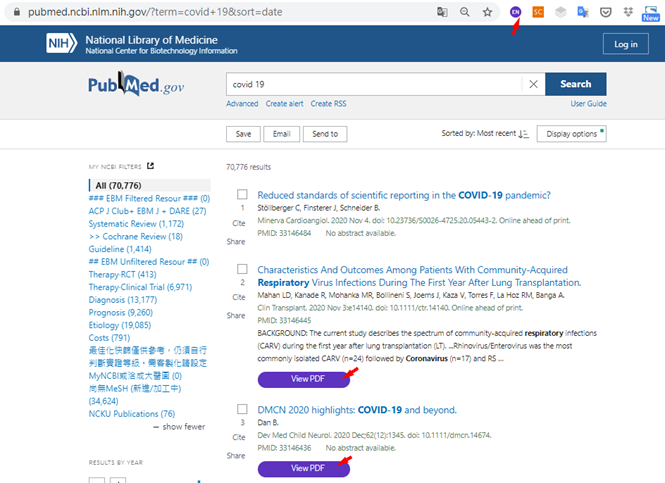
Medical Database
MEDLINE, a medical periodical database, produced by the National Library of Medicine (NLM) in the United States has effectively indexed literature papers with MeSH controlled vocabularies to facilitate effective searching. You can choose a suitable search interface for inspection and examination.
Featuring a sizable database of biomedicine papers, MEDLINE collects journal articles and conference papers and provides Emtree for deep indexing as well as multiple index interfaces to meet needs for different indexing purposes.
This authoritative research database for nursing and relevant medical health professionals enables users to get fast and easy access to top journals, evidence-based care sheets, and quick lessons, etc..
EBM Database
It is the product of the expertise, experiences, and opinions of doctors and professional teams following a review of over 440 medical journals and database searches, with reference to scholarly guidelines, federal clinical reports, and conferences. UpToDate covers over 10,000 reviews on clinical topics, some of which also provides Summary and Recommendations (Recommendation: 1-2, Level of Evidence: A-C). Link to Lexi-Comp drug database is also provided.
Features: It covers a large number of topics, queries can be made in Chinese, descriptive texts allow for easy reading, and it collects clinical guides of different countries.
DynaMed is an evidence-based clinical decision reference tool. A group of editors monitors over 500 medical journals, secondary medical sources, evidence-based medical resources, drug information resources, and clinical practice guidelines, sorting them into more than 3,400 clinical and drug topics clearly labeled with source and level (1-3) of evidence (while preserving the recommendations or evidence labels of the cited guidelines). Shared Decision-Making information is also provided. Drug evidence information comes from Micromedex.
Features: It provides new updates and highlights of cited paper at the top of each page, collects clinical guides of different countries, and includes Choosing Wisely.
Citation Database
A citation database features the ability to index basic bibliographic information of each article and the names of all authors, their affiliated institutions, and bibliography. By using three types of citation relations—i.e., references (retrospection of previous studies), cited references (follow up of subsequent studies), and relevant literature, citation database can conduct literature search in a snowball manner. This is also recommended for researchers who want to search for research papers across different disciplines or comprehensive disciplines.
The scope of NCKU's subscription includes the Web of Science Core Collection, i.e., Science Citation Index Expanded (SCIE), Social Sciences Citation Index (SSCI), and Arts & Humanities Citation Index (AHCI), which contain over 21,100 journals.
Scopus collects over 22,000 journals and also shows the controlled vocabularies exclusive to MEDLINE and Embase if bibliographic records are also indexed in these databases. It provides researchers with an alternative path for indexing.